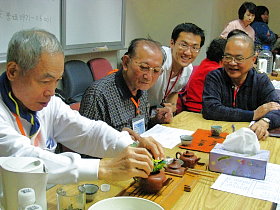Program Offering the Elderly Mini-Classes on College Campuses

In response to an ageing population and the fact that parents are having fewer children, the Ministry of Education (MOE) has launched a program that offers the elderly mini-classes on college campuses on a trial basis. These classes aim chiefly to utilize the quality teaching environments and teachers of universities to design courses that cater to the physical, mental and spiritual needs of the elderly. Each class lasts five days and four nights, with all the students required to live on campus. University adult educational research teams designed the classes after referring to the ideals and practices adopted by similar US classes. In addition to required courses that acquaint the elderly with successful ageing and geriatric psychology, electives, and general knowledge, other programs include physical education, service learning, club activities and campus life courses so that the elderly can enjoy a university atmosphere and interact more with young students.
A total of seven universities are taking part in the program, having offered 21 classes of this type from November to mid-December, with 420 persons aged 60 and over attending. Among them, one was over 90 years old and 15 over 80. Twenty-three had received not more than an elementary school education.
The MOE hopes these classes can usher in a new era of universities, providing a wide variety of study opportunities so that schools can become the center of studying for the aged. This will give the elderly access to academic resources and opportunities that may enrich their lives.
National Chung Cheng University , one of the universities taking part in this program, indicates many seniors are used to staying home and feel increasing useless. However, after attending service learning classes, the university discovered some community volunteers were elementary school-educated, some of which were even illiterate. Nevertheless, these elderly volunteers still contributed to improving their communities. Many elderly people found that despite old age they could still have dreams and goals.
Currently, Taiwan 's aged population nears 2.4 million (10.41%). In 2025, Taiwan will have a super-aged population. According to the Ministry of the Interior, in 2007 the Taiwanese had a life expectancy of about 78.5. Whereas, according to Directorate-General of Budget, Accounting and Statistics, the average retiring age in 2006 was 55.2. Therefore, Taiwanese could enjoy an average of 23 years of retirement. Educating and studying are the secret of an energetic, happier and more dignified life in old age.
In recent years, the MOE has devoted much effort to promoting education for the elderly. In addition to the above-said program, in collaboration with 368 towns and cities across the country, the MOE in 2008 set up 105 Learning Resources Centers for the Elderly in an attempt to provide aged people with easily accessible learning resources. The MOE hopes, through the joint efforts of various government agencies, an Energetic Learning Map for aged people can be drafted so that they know despite old age they can still learn and enrich their lives.
For more information on Learning Resources Centers for the Elderly, view Education of the Elderly webpage on the MOE website at https://moe.senioredu.moe.gov.tw/.
Attachment(s) for download
- Chinese textChinese text.doc
